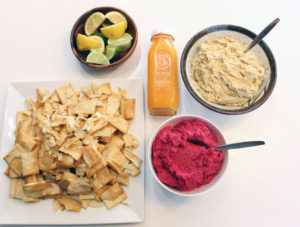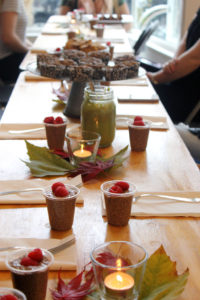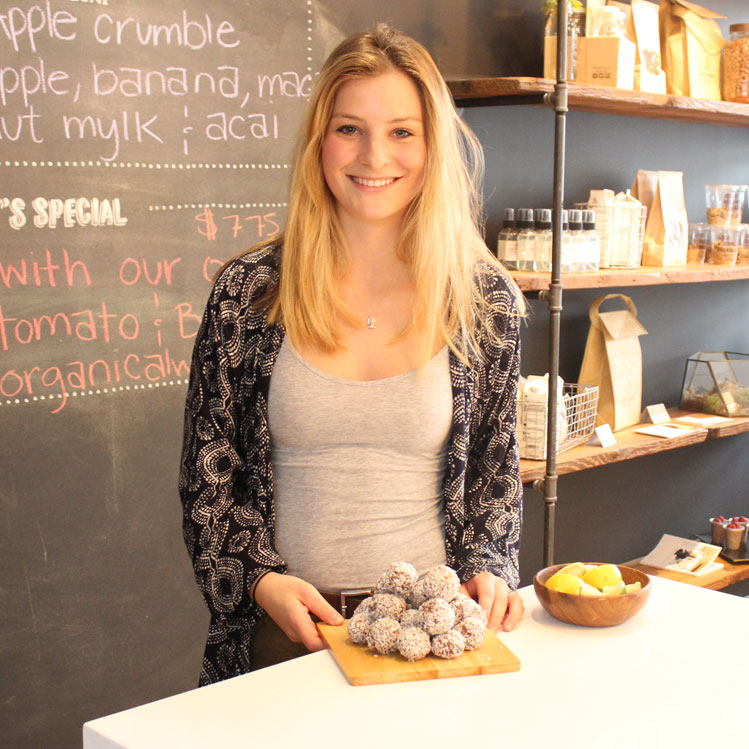Plant-Based Eating
An Introduction to Healthy Plant-Based Eating
This little guide is designed to make transitioning to a heavily plant-based diet easy, fun and exciting! Let’s get down to basics…
Vegan vs. Plant-Based
By definition, a vegan diet consists of all foods excluding animal products and animal by-products including eggs, dairy, honey etc. A plant-based diet, by definition is a diet derived from plants, including vegetables, whole grains, legumes and fruits, but with few or no animal products. A plant-based diet can mean something different to everybody.
Plant-Based Protein Sources
There is often a misconception that it is difficult to find protein in a vegetarian or vegan diet. This is untrue…it actually quite easy and effortless! Plants, grains and nuts all contain natural sources of protein and if you eat a variety of each of those, it is easy to meet your daily requirements. Here are a few sources where you can find contentrated sources of plant-based protein:
Quinoa
Rye
Beans (chickpeas, black, pinto, etc.)
Soy (opt for fermented soy products like tempeh & miso)
Green peas
Nuts & Nut butter
Leafy Greens
Hemp Seeds, Chia Seeds
B12? Iron?
Vitamin B12 and Iron are big concerns that arise when people talk about vegetarianism/veganism. After doing lots of research, I realized that it’s just as easy to find B12 and iron as it is protein in a vegan diet! Vitamin B12 is known to be only found in animal sources, but this is false.
Your large intestine actually produces B12 naturally, so we only require small amounts of it anyways. Your body can store B12 for many years after consuming it, so supplementing with B12 is not always necessary right away. Another great way to find B12 is in fermented foods such as raw sauerkraut and kombucha!
Iron is also often a worry, because we seem to be taught that iron only comes from red meat, which is also not true.
Some great iron rich plant-based food sources are blackstrap mollases (look for raw, unsulphured organic), chickpeas, black beans, spirulina, quinoa, oats, lentils, cashews, raw cocoa, spinach, pumpkin seeds, leafy greens, tofu, tempeh and tahini.

Foods to Heal Your Gut & Promote Digestion
Lemon water & apple cider vinegar in the morning (to produce HCl acid for good digestion and to get your system active first thing in the morning)
Aloe Vera Juice (to soothe and heal)
Probiotics such as kombucha, raw sauerkraut, etc. to create healthy bacteria in your gut, which can promote proper digestion, help with immunity and other problems
Skin-Healthy Foods
We all love beautiful, glowing skin and that’s just one of the amazing benefits of following a plant-based diet! Including healthy fats in your diet can really help repair damaged skin. Some of my favourite skin-healthy foods include:
Berries
Leafy Greens
Garlic
Turmeric
Avocado
Lemons/Limes
Papaya
Coconut (oil, milk, butter)
Activated Coconut Charcoal
Why Carbs are your Best Friend
Wait, what? Carbs are good? YES! Carbs are indeed good! In fact, carbs are your best friend when it comes to a plant-based diet. Focusing meals around good carbohydrates like yams, potatoes, rice, veggies, fruits, lentils, beans, etc. are all great sources of energy that your body loves.
Some great quick & easy high-carb meal options are:
Steamed rice, beans and sweet potatoes with your favourite veggies.
Cooked oatmeal
Baked potatoes
Loading up a smoothie with a 4-6 ripe spotty bananas is a great way to provide energy (fructose which is converted into glucose, which is your body’s and brain’s preferred source of energy) for a pre-workout or a big day ahead of you. Fruit is very easily digested and is a great option any time of the day. I recommend to never ever ever restrict your fruit intake.

Blending Vs. Juicing
Smoothies and juices often play a big role in a plant-based diet, or a healthy diet in general. They are both great ways to get your veggie/fruit intake! Smoothies make for an awesome breakfast
Juicing takes away the fiber in fruit/veg, which leaves you with easily digested nutrients that can sink into your blood stream easily. Juice is a great option if you are looking for a quick energy boost, if you aren’t able to stomach food, if you are dealing with inflammation, a common cold, digestion issues or if you need a quick way to get in some extra greens! Always opt for organic, cold-pressed, unpasteurized or “raw” juice, like The Juicery Co. juices!
Smoothies are your best friend!
Smoothies are a great way to get in a good amount of calories and healthy carbohydrates for the day. Having a smoothie for breakfast is a good option because fruit and veggies are easily digested first thing in the morning. Smoothies contain fiber so they are more filling than juice. Keeping frozen fruit in your freezer will help make blending much easier.
Recipes
More on www.thepurelife.ca
Easy Green Breakfast Smoothie:
4 ripe bananas, previously peeled and frozen
1 handful of organic baby spinach
½ cup of almond milk (preferably homemade)
1 cup of water
1 tbsp hemp seeds, for an extra protein boost
1 tsp maca powder, for hormone balancing
Blend all ingredients in a high-speed blender until combined. Enjoy fresh or store in a sealed mason jar for breakfast the next day, or a snack for later.
Detox Quinoa Salad:
2 cups cooked quinoa
1 handful of organic leafy greens
1 handful of finely chopped parsley
1 handful of finely chopped cilantro
1 avocado, cubed
1 cup of cucumber, finely chopped
Dressing:
1 tbsp olive oil
The juice of 1 lemon
Pinch of tumeric
Pinch of cumin
1 tbsp apple cider vinegar
Himalayan salt & pepper, to taste
Cook the quinoa and fluff with a fork. Once the quinoa has cooled, add the veggies and spices and enjoy fresh or for lunches throughout the week.
Avocado Chocolate Mousse:
(Serves 4)
4 ripe (spotty) bananas
3 ripe avocados
2 heaping tbsp of raw cocoa powder
¼ cup 100% pure maple syrup
Blend all ingredients in a food processor or a blender until creamy. Refrigerate overnight for more of a “pudding” consistency, or eat fresh. Top with fresh berries.
Healthy Homemade Peanut Butter Bars
1/2 cup (or more, if desired) of all natural unsalted peanut butter
1 cup of dates
1 cup of oats
1 cup of mix-ins (dairy-free chocolate chips, cranberries, coconut, etc.)
In a food processor, combine the oats and dates until well combined. Add the peanut butter and blend until combined (creamy). Transfer to a bar and add desired mix-ins. Form into balls or bars and store in the fridge or freezer for an easy protein-packed snack.
 Plant-Based Grocery List (Winter)
Plant-Based Grocery List (Winter)
Pumpkin, Squash, Yams, Zucchini
Salad greens (whatever is in season), Baby Spinach
Beets, Potatoes, Carrots, Celery, Mushrooms, Cucumber, Bell Peppers
tropical fruit and out-of-country produce like avocados, bananas, oranges, mangoes, lemons, limes, fresh herbs etc.
Hemp, flax & chia seeds
Nuts (Almonds, Cashews, etc)
Quinoa & Rice in bulk
Oats, dates (medjool are the best)
Healthy crackers or snacks (Like Mary’s crackers)
Cans of (Amy’s Organic) Soup for busy, lazy nights
Brown rice pasta, black bean noodles
Frozen fruit/veggies (berries, mango, broccoli)
Maple syrup, brown rice syrup, coconut sugar
Garlic, onion, ginger
Rice milk & almond milk (with no additives)
Seeds (pumpkin seeds, sunflower seeds)
Organic ketchup
Coconut milk, canned organic beans (chickpeas, black beans, etc.) and lentils
Tomato sauce
Peanut or almond butter, tahini
Vegan ice cream (Coconut Bliss)
Superfoods like maca powder, acai, raw cocoa, spirulina, etc.
Spices like cinnamon, turmeric, himalayan salt, black pepper, red chili flakes, cumin, cardamom
Foods to Buy in Bulk:
Nuts (Almonds, Cashews, etc)
Quinoa
Rice
Pasta (I love Brown Rice pasta)
Frozen fruit/veggies (berries, mango, broccoli)
Oats
YAY!
You are now on your way to following a healthier, whole-foods, plant-based diet – congratulations. I am so excited for you! I hope this diet will bring you happiness and health in all aspects of your life as it has done for me.
With Love,
Sisley

